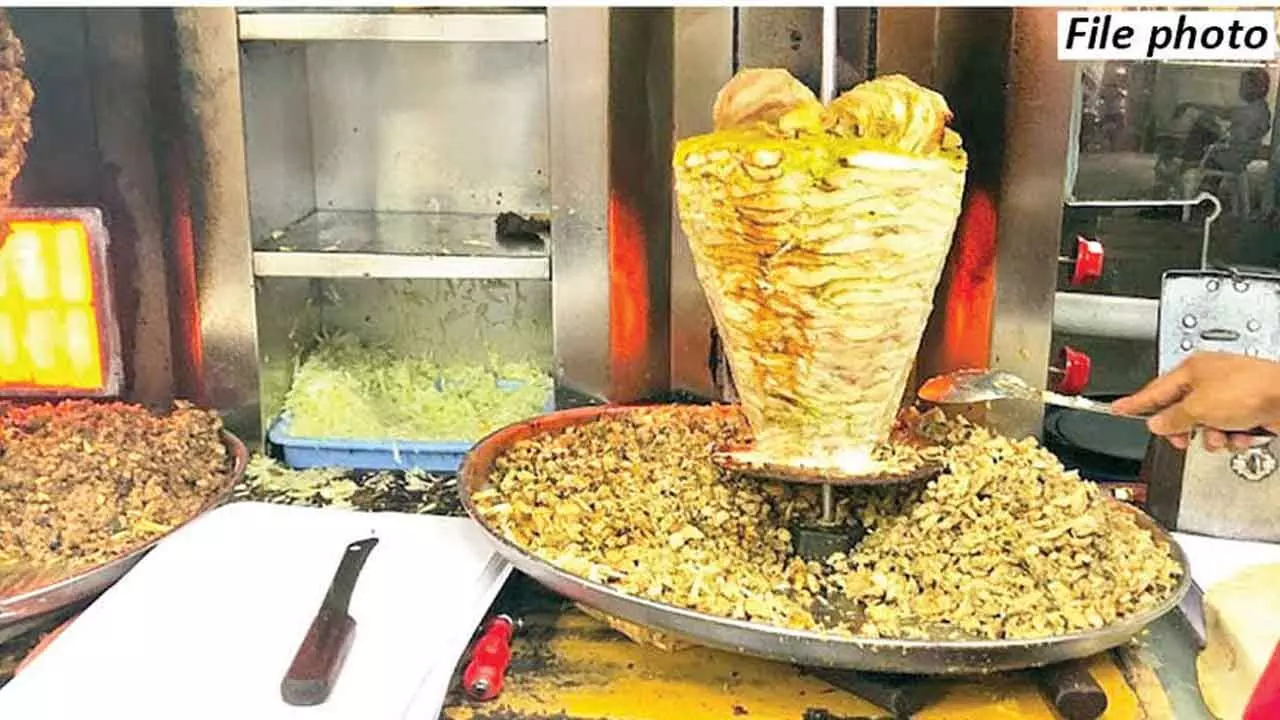Live
- Help in comprehensive development of Nellore dist
- Death toll in Punjab building collapse rises to two
- Make Christmas celebrations merrier and healthier with California almonds
- A carrom ball that bowled everyone: PM writes to Ashwin on his retirement
- Kashi Math Samsthan seer worships Lord Balaji
- Gold rates in Delhi today stable, check the rates on 22 December, 2024
- Gold rates in Vijayawada today stable, check the rates on 22 December, 2024
- Purandeswari responds to Allu Arjun arrest in stampede case, says it is not one's fault
- Threads of trust and love
- Belagavi AICC session centenary message
Just In
Shawarma prices to surge as mayonnaise ban hits State


Alternatives like cashew mayo impact restaurants’ expenses
Hyderabad: Shawarma lovers would have to shell out some extra bucks, as the cost of the delicious dish would be increasing in the city following the recent government ban on the production and sale of condiment, mayonnaise. Restaurants and other eatery owners argue that certain dishes simply would not be the same without traditional mayonnaise. They also point out that preparing a mayonnaise alternative without raw eggs would significantly increase costs.
Mayonnaise is a common condiment in street foods like sandwiches, wraps, salads, and other snacks, which is made by eggs, oil, and some vinegar and lemon, which also poses a significant health-related issue.
The popularity of this condiment has surged in recent years throughout the city. People of all ages, from children to the elderly, are increasingly choosing fast food items paired with mayonnaise. This creamy delight has become a beloved staple among foodies, who consistently request extra mayonnaise to enhance their meals.
The Telangana State government on October 30 banned mayonnaise made with raw eggs for a year due to food safety concerns under Section 30(2)(a) of the Food Safety and Standards Act, 2006. The State government took this decision after a woman died and 15 others fell ill after eating momos with mayonnaise in Hyderabad. However, despite a prohibition on the production and sale of mayonnaise, restaurants, mandi and shawarma houses, fast food centres, and other eateries continue to serve, which is considered unsafe.
The health enthusiasts were frustrated over the inadequate enforcement of the ban, as hoteliers persist in serving traditional raw egg mayonnaise while consumers continue to indulge in it without considering the potential health risks.
According to hoteliers, mayonnaise is also served in restaurants with the shawarma, wraps, mandi, kabsa, grill chicken, broasted chicken, starters or platters, and tandoori platters, among others. Ali Raza Kazmi, an owner of Lucky Group of restaurants, emphasised that there is no substitute for the condiments used in their dishes, which are essential for enhancing the flavours of items like grilled or broasted chicken and platters. He explained, “Traditional mayonnaise is crafted from eggs and oil, but in light of the ban, creating an alternative without raw eggs would lead to a substantial rise in expenses.”
He mentioned that mayonnaise can also be made by blending boiled potatoes with oil, but this method fails to elevate the dish's flavour, as the purpose of this condiment is to enhance taste. Another option for making mayonnaise involves using cashews, cream, and oil; however, this would be quite expensive for hotels to offer in wraps or on platters.
Abdul Shafeeq, owner of Shawarma Point in Mallepally, expressed that using potato-based mayonnaise does not improve the flavour of shawarma, which is prepared with marinated meat or chicken. He noted that options like cashew and cream can be expensive. Before the ban, the eateries might have ensured that the condiment must be prepared daily and avoided being used for the next day. The eggs pose a health risk due to the contamination of harmful bacteria, which leads to the food borne illness.
Additionally, he pointed out that the commercially available mayonnaise is unsuitable for shawarma, wraps, and other non-vegetarian dishes due to its sourness and high vinegar content.
“The traditional mayo is banned now, and if the cooks begin preparing cashew, cream-based alternatives, we could see a rise in shawarma prices soon. Additionally, restaurants might impose higher charges for mayonnaise,” said Ali Raza.

© 2024 Hyderabad Media House Limited/The Hans India. All rights reserved. Powered by hocalwire.com






